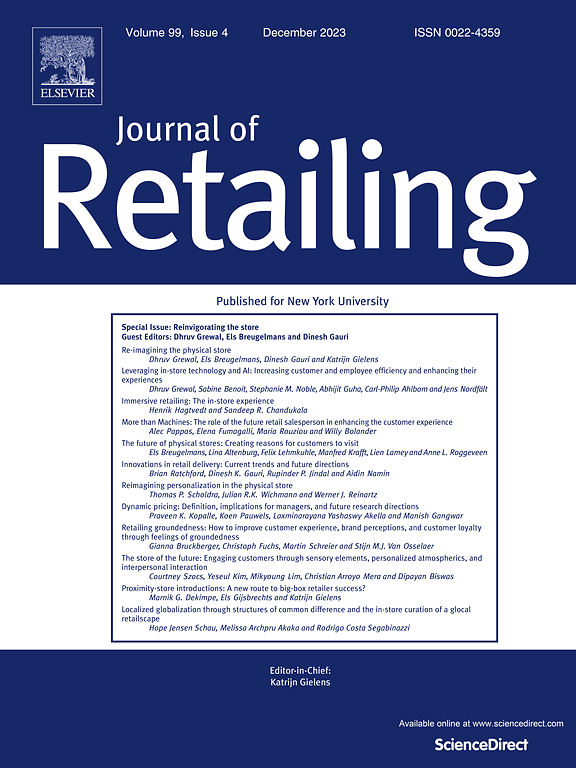卡路里流畅的错觉:元认知的不确定性如何导致对食物不那么极端的健康看法
IF 10.2
1区 管理学
Q1 BUSINESS
引用次数: 0
摘要
卡路里信息经常显示在购买食品的零售场所,包括杂货店、大卖场、餐馆、咖啡厅、便利店和专卖店。法律要求某些类型的零售商在包装、菜单或菜单板上显示卡路里计数。传统观点认为,随着人们越来越多地接触到卡路里信息,他们会做出更明智的选择,也能更好地判断食物的健康程度。这项研究提出了卡路里信息对消费者食品评价的更微妙的影响。具体来说,这项研究假设消费者通常对自己使用卡路里来评估食物的能力过于自信,这种虚幻的流利可能是无处不在的卡路里信息的结果。与这种虚幻的流畅性解释相一致,这项研究发现,当消费者试图在评估或估计任务中使用卡路里信息时,结果可能会产生元认知不确定性,从而导致对食品健康的更温和(即不那么极端)的评估。在试图利用他们的卡路里知识来判断或评估之后,消费者随后将不健康的食品评价为更健康的,而健康的食品评价为不健康的。九项实验支持这样的预测,即在判断中使用卡路里信息的元认知不确定性可能导致对食物健康的更温和的评估,以及更少的健康食品选择。本文章由计算机程序翻译,如有差异,请以英文原文为准。
The illusion of calorie fluency: How metacognitive uncertainty leads to less extreme healthiness perceptions of foods
Calorie information is frequently displayed in retail settings where food items are purchased, including grocery stores, hypermarkets, restaurants, cafés, convenience stores, and specialty shops. Some types of retailers are legally required to display calorie counts on packaging, menus, or menu boards. Conventional wisdom suggests that as people become more exposed to calorie information, they will make more informed choices and will be better able to judge the healthiness of foods. This research proposes a more nuanced influence of calorie information on consumers’ food evaluations. Specifically, this research hypothesizes that consumers are often overly confident in their ability to use calories to evaluate foods, an illusory fluency that is likely the result of the ubiquity of calorie information. Consistent with this illusory fluency account, this research finds that when consumers attempt to use calorie information in an evaluation or estimation task, the result can create metacognitive uncertainty, resulting in more moderate (i.e., less extreme) evaluations of the healthiness of foods. After trying to utilize their calorie knowledge in judgments or evaluations, consumers subsequently evaluate unhealthy foods as healthier, and healthy foods as less healthy. Nine experiments support the prediction that metacognitive uncertainty in the usage of calorie information in judgments can lead to more moderate evaluations of the healthiness of foods, and less healthy food choices.
求助全文
通过发布文献求助,成功后即可免费获取论文全文。
去求助
来源期刊

Journal of Retailing
BUSINESS-
CiteScore
15.90
自引率
6.00%
发文量
54
审稿时长
67 days
期刊介绍:
The focus of The Journal of Retailing is to advance knowledge and its practical application in the field of retailing. This includes various aspects such as retail management, evolution, and current theories. The journal covers both products and services in retail, supply chains and distribution channels that serve retailers, relationships between retailers and supply chain members, and direct marketing as well as emerging electronic markets for households. Articles published in the journal may take an economic or behavioral approach, but all are based on rigorous analysis and a deep understanding of relevant theories and existing literature. Empirical research follows the scientific method, employing modern sampling procedures and statistical analysis.
 求助内容:
求助内容: 应助结果提醒方式:
应助结果提醒方式:


